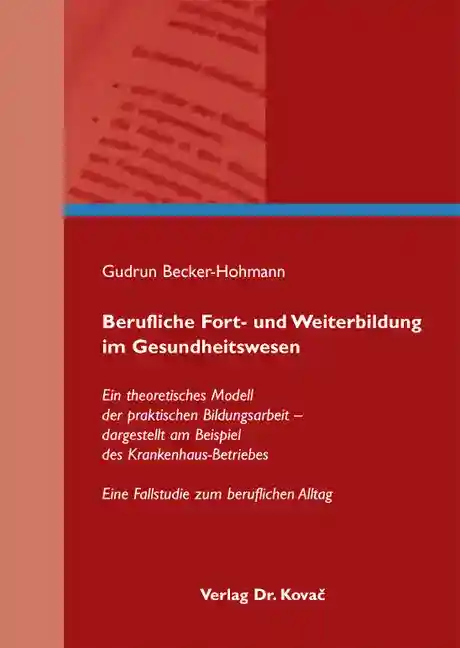Gudrun Becker-HohmannBerufliche Fort- und Weiterbildung im Gesundheitswesen
Ein theoretisches Modell der praktischen Bildungsarbeit – dargestellt am Beispiel des Krankenhaus-Betriebes. Eine Fallstudie zum beruflichen Alltag
Studien zur Erwachsenenbildung, volume 32
Hamburg 2011, 484 pages
ISBN 978-3-8300-5741-3 (print)
ISBN 978-3-339-05741-9 (eBook)
Rezension
[…] Die vorliegende Arbeit ist einerseits als Dissertation konzipiert, die an einer philosophischen Fakultät eingereicht wurde. Sie stellt damit vergleichsweise hohe Anforderungen an Begrifflichkeiten, an die Vorkenntnisse aus der Pädagogik sowie an qualitative Forschungsmethoden. Andererseits handelt es sich um eine Fallstudie, die auf einer langjährigen Erfahrung basiert. Die vorliegende Arbeit ist folglich einerseits all denjenigen zu empfehlen, die auf der Suche nach einem theoretischen Konzept der Fort- und Weiterbildung in Krankenhäusern sind, andererseits ist sie lesenswert für Wissenschaftler, die ein Beispiel für eine konkrete Anwendung pädagogischer Theorie suchen. […]
About this book deutschenglish
Despite the size of the institutions concerned, the large numbers working in them, and the changes taking place in many areas of work, further and advanced professional training in the health sector, specifically in hospitals, has hitherto been the subject of little institutional and academic analysis.In the present study an attempt is made to present a theoretical model for further and advanced professional training in hospitals. The status, function, and potential of the model are analysed, measured against the theoretically based macrodidactic and microdidactic development of work in further training between 1989 and 2005. Methodologically, the investigation is based on the case study approach in combination with evaluation using qualitative content analysis.
The theoretical model exposes macrodidactic and microdidactic areas of action, high-lighting factors integral to the planning of programmes in the light of implications for their realisation in practice. In the process of practical work the model – providing both a scheme designed to motivate and shape action and also a stimulus for further analysis – has contributed considerably to the qualitative development of institutional training. It argues the need to establish awareness of problems in broad process-based adult education so that further training is above all directed towards the professional context of the work of every individual concerned within the institution in which she or he operates.
Internal training programmes are seen in the context of didactic institutional planning as being systematically planned for chosen groups to fit in both with professional work and with learning arrangements in the institution in question.
Analysis of the planning of didactic programmes shows how a theoretical model is worked with, what influence macrodidactic factors have on further and advanced professional training, and what the potential structures of adult education and training are.
In a longitudinal analysis the profile of didactic programme planning for the chosen period was worked out in relation to selected (clearly explained and justified) priorities. This profile is also, of course, related to findings emerging from analysis of budgeting and of overall costs of further professional training.
Results in the microdidactic area are related to programmes (all planned, tested and evaluated) such as Train-the-Trainer or Supervision, and examples of professional training courses in the area of care.
The results of the case study will be of interest to all concerned, in theory and in practice, with the construction and development of work in professional development in the health sector and in hospitals.
